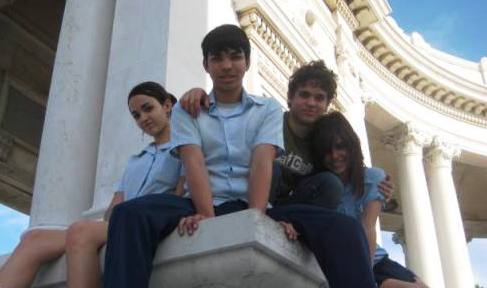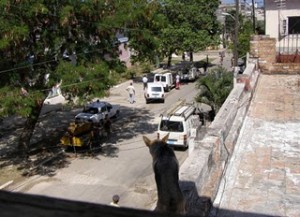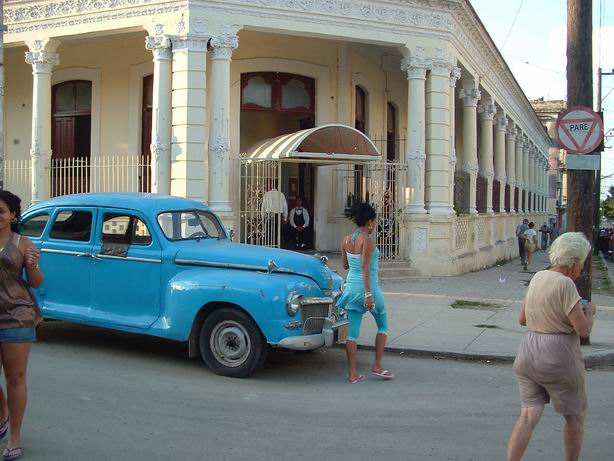At dawn on March 18 I was kidnapped along with Aimé Cabrales Aguilar at the corner of Calzada de Infanta and San Tomas a few meters from my house and on a public street, from a bus with a veneer of tourism in which women in the uniform of the National Revolutionary Police (PNR) came, along with two Chinese-make Geely cars with private license plates with State Security agents who wore civilian clothes, easily identified by their cruel faces and well-fed bodies.
At four in the morning and after a struggle between these women and us, we were then attacked as if we were two highly dangerous women and taken in the Geely to the Cerro police station at Infanta and Amenidad, where they led us to the back and put us in separate rooms. Within seconds an individual appeared whose rank I couldn’t make out because we had a little altercation and he immediately took my cell phone and then took me from there, in a police car escorted by a policewoman in uniform, who had my phone and an arrest warrant that said “Counterrevolutionary,” although it wasn’t written in this way but as “Counter revolutionary,” an adjective they use every day and don’t even know how to write.
Then began a long journey until we reached the Santa Fe station where I was rejected by the officers on duty when they were shown the warrant, and in a matter of minutes they decided to take me to the station at 7th and 62nd station in the municipality of Playa, better known as the Fifth Station (La Quinta), where they searched me thoroughly taking my wallet and all my belongings including my clothes.
An official from police criminal investigation (CIM) tells me, from a distance, that I have to change clothes and approaches with a gray uniform with white numbers, my only words were, when the guy from CIM came I told him he should put it on, and then I saw how their faces started to change and his response was only, “No, relax,” and they showed me to cell 7 where I remained from 6:30 AM on March 18 to 10:00 PM on the 19th, without taking any food or water as a protest for the arbitrariness of the detention. The total was 42 hours.
In that same humid cell there were three women dressed in gray, with uncombed hair, gloomy faces, and smoking uncontrollably. Yenima was there for embezzlement and had been in that same place for 39 filthy days. They could not prove her embezzlement case, so they are now trying to get her through falsifying signatures, but once again have no proof. She works for CIMEX corporation and must be either 39 or 40 years old. She has two sons, one who is 16 and the younger one who is 3, both which she has not been able to see during this whole time.
Betty is another young woman, a hair-dresser with a 10-year-old daughter who kept a bag of medicine in her house for a friend. It turns out, the contents were actually prescribed medications which can be used as drugs. She turned it in to the police and now awaits preventive prison.
Yuvisnavi, the other young 30-year-old, was out partying with her husband when she had some drinks and began filling ill. They quickly went to the nearest clinic and had an argument with some police officials. The cops beat both of them savagely. She still had the scars on her body to prove it, as well as a missing tooth, the result of a punch. She threw a soda can at the cop’s back and the couple now awaits a fiscal petition which will accuse them of “attempt on someone’s life”.
Upon noticing that I was wearing different clothes than they were, they began to ask me thousands of questions at the same time. We entered a lengthy conversation. They already knew who the Ladies in White were, and I then explained to them a bit about the organization I belong to, the Cuban Democratic and Independent Party, in addition to our purpose and the activities we carry out.
During the afternoon hours they took me out of the cell so that doctor could examine me and fill out a brief clinical record for me. After a while, the prison guard took me to a small interrogation room where a State Security official, claiming to be called Vladimir, waited for me. I was there with that arrogant man with a harsh voice for 2 and a half hours. Throughout the entire time, however, I displayed a vibe of indifference, for I knew I was going to be kept there anyway. He then told me that I would be re-educated there, among other threats. He jotted down a few things about my life on various pages which made up my file.
Later, I was returned to my cell and entered into another room where they took various photos of me — one with a ruler measuring my height, one of the right side of my face, the left side, with my glasses, without them, barefoot, with my feet together, etc. They also took my digital fingerprints and filled out a sheet with my general physical details.
Since my cell was at the entrance of the waiting room, I could see that there was another woman dressed in White. It was Tania Maldonado, also a Lady in White detained under the same conditions as me, as she left her house with Sarah Marta Fonseca. They were separated in the same fashion I was separated from Aime, who I did not know where she was.
I felt a bit relieved that there was someone I knew there. She was also taken to cell # 7 and also chose to cease eating or drinking liquids. For this reason we were constantly being visited by the Chiefs and Officials of the Unit, as well as doctors and CIM agents. Going on strike, as they call it, is something which worries them deeply, in addition to the fact that we kept shouting that we were peaceful women who were being kept there against our will. We also told them that whatever happened to us from that moment on during our detention was completely the responsibility of the Cuban government and all the repressive organs of State Security. They would constantly take our blood pressure, and did the same to Hector Julio Negrin Cedeno who was also detained a few blocks from Laura’s house and who assumed the same rebellious posture.
Late that night, official Tamayo from section 21, and Tomas both entered my cell and I had yet another interrogation for a few hours. I kept my same posture, with the same indifference I displayed before, but this time I had a very bad headache due to the lack of food. They asked me why I did not eat then and I responded by saying that in addition to protesting, not even dogs would eat the food they offered. The menu was always white rice, boiled potato, and something else which I could not decipher. It was some sort of omelette which would cause heartburn in the women who ate it, and there was no medicine available afterwards to calm the sensation.
As was expected, both these agents touched upon the subject of the CID, that party which robs them from sleep. They mentioned Huber Matos and his organization inside the island. Among the threats I received was one that, after they finish off the Ladies in White, they were going to go after the CID to end it. They stated that they knew I had been in the province of Pinar del Rio and that everything was prepared so my arrest would take place in that area.
According to Tamayo, he told his friends from Pinar del Rio to leave me alone because he would easily catch me here. Did he think that for a moment I was going to hide? He talked to me about the CID in general — about when the elections were, etc. He gave off the impression that he was very misinformed and wanted to gather more information, but he failed. He then said that the CID was a lie and that Huber Matos was asking for money throughout all of the United States. I ask myself, if it’s all such a lie then why do they constantly oppress and harass each one of its members? This group is here to stay, I would repeat them over and over again. And they are scared of that.
They returned me to my cell and re-appeared shortly thereafter with some crackers, bread, soda bottles, and Dipirona tablets. To ease my headache, I got a pill out of the bottle after checking that it was sealed. A doctor then appeared to examine me again. They then took away all the other things they gave me to eat because I did not touch any of it. The agents asked the doctor if he had any injection they could put on my tongue or an electro-shock that would change my thoughts. I didn’t even pay attention, and I only responded by asking the doctor if he had two of each because the guard would need it as well.
Back in my cell, where I could not shower, I threw a a mat on the floor and both Tania and I laid down. We actually fell asleep quickly, thank God. I thought it would not be so easy to get some rest since the smell of urine was so strong, as was the presence of mosquitoes, the sound of officials slamming doors all night, and a constant ringing which would go off every time someone walked through the main gate, whether they were prisoners or police officials. There were also constant arguments between the authorities. They used very obscene and vulgar words against each other, and despite the fact that they speak the same language, they still cannot manage to understand each other.
They had an elderly lady in custody, but she was not being kept in a cell. Instead, she slept on a stone bench. She had been taken by the DTI (Department of Technical Investigation), together with her son who was also in a cell and carrying out a strike. She was a very corpulent woman who arrived to the jail at the same time as me. When I left, she was still there, and as I stepped out she came close to me and said, “Tomorrow, when you go to Church, pray to Saint Rita for me and my son”. I never knew why they were there. They didn’t give us time to talk.
During the next morning the parade of the authorities continued. They kept checking our state of health, and the food somewhat improved. However, they could not convince us to eat. An official later handed me a bucket of water (for showering) and some clothes which my husband had brought me, which reassured me that people did know about my kidnapping. I shared my water with Tania, who also had to brush her teeth with my tooth brush, which is something so personal. We also shared my towel. There was no other option. A penal instructor then took me out of my cell to once again write down declarations from me. This time, she wanted to know where I was headed when I was detained and why I was not eating.
During that same time another woman, who must have been around 40 years of age, was taken into my cell. At first glance anyone could tell, based on her face and her way of talking, that was someone who had some sort of mental instability. She was there because an employee from the Aedes Aegipty Campaign pushed her elderly mother inside her house, so she (the lady in the cell) got into a fight with the employee to defend her mother. During the fight, both women ended up hurt. Immediately, the police took her to the station and they want to prosecute her under “attempt at someone’s life”. The public health worker was free from any accusations.
Once again, that night I was taken out of my cell and taken to the interrogation room. An official from Villa Marista was waiting for me. He asked me various questions, among them about my hunger strike. Then agent Vladimir appeared, who also asked me about why I was not eating. It was all a matter of 15 minutes, and when I returned to my cell I would say that 2 minutes passed and the head guard approached me and said, “Get your stuff. You’re leaving.”
They handed me my belongings, I made sure I was not missing anything, and that I had left everything in order. I put on my earrings, other jewelry, and put my lip-stick on. Agent Vladimir gave us a release letter to sign and cop car # 716 was waiting for us with an escort police officer who was holding both Tania and my ID cards. The officer also had orders to drop us off at the door of our respective homes, and she only gave me my ID card when I stepped out of the car.
Half translated by Raul G.
March 24 2011



 Here is another article by Normando Hernandez Gonzalez, Cuban ex-prisoner of conscience currently exiled in Spain. In this essay, Normando makes it clear that exiling, deporting, or simply releasing from prison is not the same thing as being freed, which is a common misconception. The civic Cuban fighter states that dissidents, and ordinary Cubans, will not achieve real freedom until the cynical and totalitarian laws which took people like him to jail for demonstrating peacefully are repealed.
Here is another article by Normando Hernandez Gonzalez, Cuban ex-prisoner of conscience currently exiled in Spain. In this essay, Normando makes it clear that exiling, deporting, or simply releasing from prison is not the same thing as being freed, which is a common misconception. The civic Cuban fighter states that dissidents, and ordinary Cubans, will not achieve real freedom until the cynical and totalitarian laws which took people like him to jail for demonstrating peacefully are repealed.


 Migdalia Estévez and her husband, Ramon Suarez, were waiting for “Cuba’s Reasons,” the TV series aired on Mondays on the island. They understood what subversion is, the media war, and the imperialist maneuvers. But they still don’t understand the government’s bitter struggle against cable TV or satellite dishes.
Migdalia Estévez and her husband, Ramon Suarez, were waiting for “Cuba’s Reasons,” the TV series aired on Mondays on the island. They understood what subversion is, the media war, and the imperialist maneuvers. But they still don’t understand the government’s bitter struggle against cable TV or satellite dishes.
